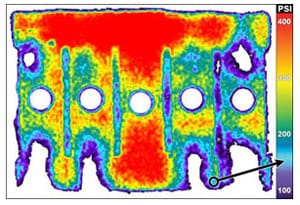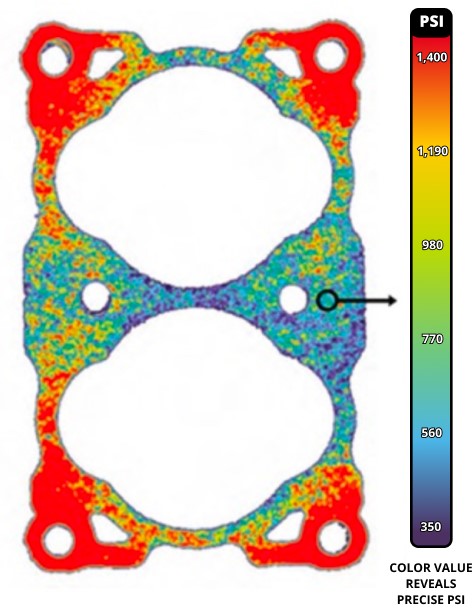Article: Sensorsportal.com

Pressurex®, a thin flexible film from Sensor Products Inc., is a versatile tool for quality control and machine component inspection. Its ability to easily and rapidly show inconsistencies in surface pressure between mating or contacting surfaces has lowered scrap rate and assisted in the design and manufacture of many industrial and electronic products.
Recently Futek, a leading US manufacturer and supplier of load cells, torque and pressure sensors, experienced difficulty assembling some of their load cells to their specifications. By performing several tests, and controlling for different variables, they found fluctuations in clamping pressure to be a significant factor.
Futek’s sensors incorporate metal foil strain gauge technology. The adhesive they use to bond the gauges to their sensors requires a clamping pressure of 50-75 psi. However, by using Pressurex®, James Meiselbach, a Mechanical Engineer at Futek, was able to see that the pressure fluctuated from 50 psi to upwards of 200 psi in some of their production runs. This discovery led Futek to use Pressurex® to help redesign several of their clamps to incorporate silicone die springs to regulate the pressure more precisely. “A sample pack of Pressurex® which revealed different surface pressure ranges allowed our production to continue,” said Meiselbach.
Pressurex® reveals surface pressure from 2 – 43,200 psi (0.14 – 3,000 kg/cm²). No training or instrumentation is required. It is ideal to assess surface contact inconsistencies in virtually any industrial or electronic application, including gaskets, clamps, bolted joints, connectors, heat sinks, heat sealing elements, welding heads, and plastic and composite manufacture, among others.
Meiselbach found using Pressurex® to be a simple procedure. To measure the surface pressure of a clamp around the outside of a load cell, he cut Pressurex® in the configuration of the clamp surface area, placed it in between the clamp and the load cell, applied force, unclamped it, and removed the Pressurex®. He then compared the film, which changes color depending on how much pressure is exerted, to an accompanying color calibration chart.
Meiselbach became aware of Pressurex® when he previously worked for an aerospace company. “We were having a problem with the main rotor blade of a helicopter. Interference was causing a fatigue crack in one of the inner spar tubes of the rotor blade. We put a large sheet of Pressurex® in the bonding tool, bagged it up, and pressurized it in the autoclave. When we removed the film, we were able to identify the exact amount of pressure causing the crack.”



